

The legacy of the past is then bitter, and like chains in a prison, for their lost homeland grew all the more sweet to the memory as all chance of return grew hopeless.
Decades had to pass after the war between the Turks and Greeks before Greeks were permitted visas to return to visit their ancestral lands in Asia Minor, now called Turkey.
Greeks had settled there a thousand years or more before the Turks arrived with conquering armies. Relative newcomers and regarded as barbarians by the highly cultured Greeks, the horse-back bred Turks had no great love for the resident Christian Greeks, and when they subdued the Greek empire of the Byzantines thought their hold on Asia Minor was assured forever.
Yet the Greeks under Turkish rule never forgot that the land had once been theirs.
They rose up after centuries of being second class citizens, to take back with arms what they regarded as their sole birthright.
The Turks, having gained the land by right of conquest, saw absolutely no reason to let the "inferior infidel Christian" Greeks push them back into the deserts of Central Asia. Brave, dauntless, savage fighters, they gave the Greeks back everything what the Greeks inflicted on them--with interest--and won the war that broke out just after World War I.
Slaughtered and expelled from Asia Minor as "collaborators" and "co-conspirators" with the invading Greek armies, over a million surviving Greeks fled over to Greece in Europe, a strange place their eyes had never seen.
One of the few Asia Minor Greeks who escaped the massacre of Greeks in Smyrna, Lidia’s family never forgot their roots in “East Rome,” as they steadfastly called their homeland, which Ataturk, founder of his usurping country, had renamed Turkey. Lidia, the eldest, had already toured Mistra on the great southern island of her native Greece, Peloponnessos, where the last East Roman emperor, had been crowned in 1449, just four years before he died defending the holy city of Constantinople against Mehmet, the Turkish sultan.
Years before tourists discovered Mistra, it lay virtually abandoned by humanity. The cathedral, churches, citadel, palace, and dwellings lay empty. Yet her father had proudly pointed out to her the imperial family’s double headed eagle carved in the cathedral’s marble paving, the spot where their last emperor, Constantine, was crowned.
Travelling by Greek tourist ship Lidia disembarked with a huge throng at Yalova Landing, a floating dock beside the Galata Bridge that crossed the mouth of the Golden Horn and linked the old European sector of international settlements with the Old City that had once been Constantinople the capital of the Greek World but was now almost completely Turkish in culture.
Once on the bridge, she paused as the crowds swept past, her eyes full of the strange wonders of the city’s "barbaric" and "oriental" but nevertheless splendored skyline. She cared nothing for the triumphs of Turkish architecture that dominated the view. After all, to her mind, whatever the Turks boasted of were only second-rate copies of Greek Byzantine edifices.
At last she stood on her own ancestral land! Her heart surged within her at the thought. Where was the Mother Church? She was the very reason for her coming, after all. But she saw only minarets and the hated Moslem mosques. Oh! A pang shot through her, like a sword had entered her heart. She had forgotten-—the infidels had attached minarets to the Mother Church as well! And there she was!
Sadly weathered stained, flanked with towering minarets like any mosque, the Mother Church, Hagia Sophia, stood crowning the ramparts and walls of the Old City.
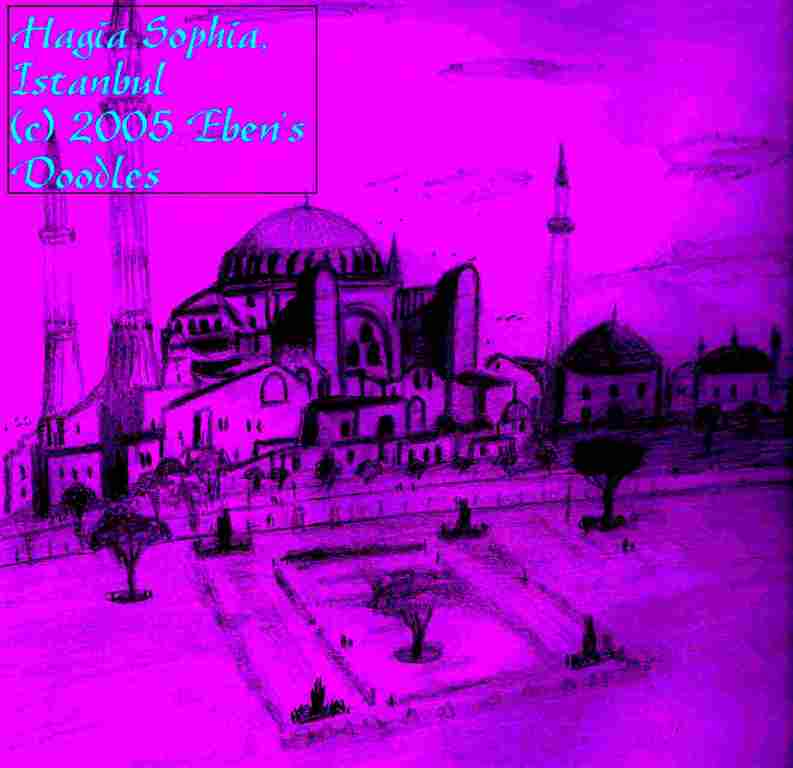
It seemed to her that she might never reach the church alive—- all the taxis and trucks and buses seemed to conspire to run her over in the square just beyond the bridge! She couldn’t find space along the streets to avoid all the people and vehicles that jammed the streets. The noise deafened her. Used to Athens her home, she had thought she knew what big cities were all about. But even Athens had not prepared her for the chaos of Istanbul. How she hated that name! But it was no longer Constantinople! She could see that at a glance, they had changed everything.
How ugly too! The dirt and smoke from the many ferries at the port coated everything—-no Greek city would look so drab and gloomy. Even the smallest, poorest dwellings were white-washed in Greece--not a speck of dirt to be seen on them! And the faces of the Turkish people-—they all appeared to be in mourning for lost loved ones! There was no hope of heaven or the Resurrection in their eyes—-none whatsoever that she could see. But she hadn't expected to see any, of course.
“Well,” she thought with some satisfaction, “they are nothing but a pack of robbers and barbarians! They came upon us with armed might and stole our country and destroyed our churches or turned them into bathhouses and granaries and worse places! They tore down our holy crosses and desecrated our altars. They raped the young women and the matrons and grandmothers too and cast young, pretty girls into brothels. So how can these wretched criminals be happy?”
Two rifle-carrying, khaki-uniformed soldiers approached her, and she felt a stab of fear. Would they spot her as an enemy Greek thinking to immigrate to Turkey because she was carrying her small suitcase? Would they take her to the station for questioning?
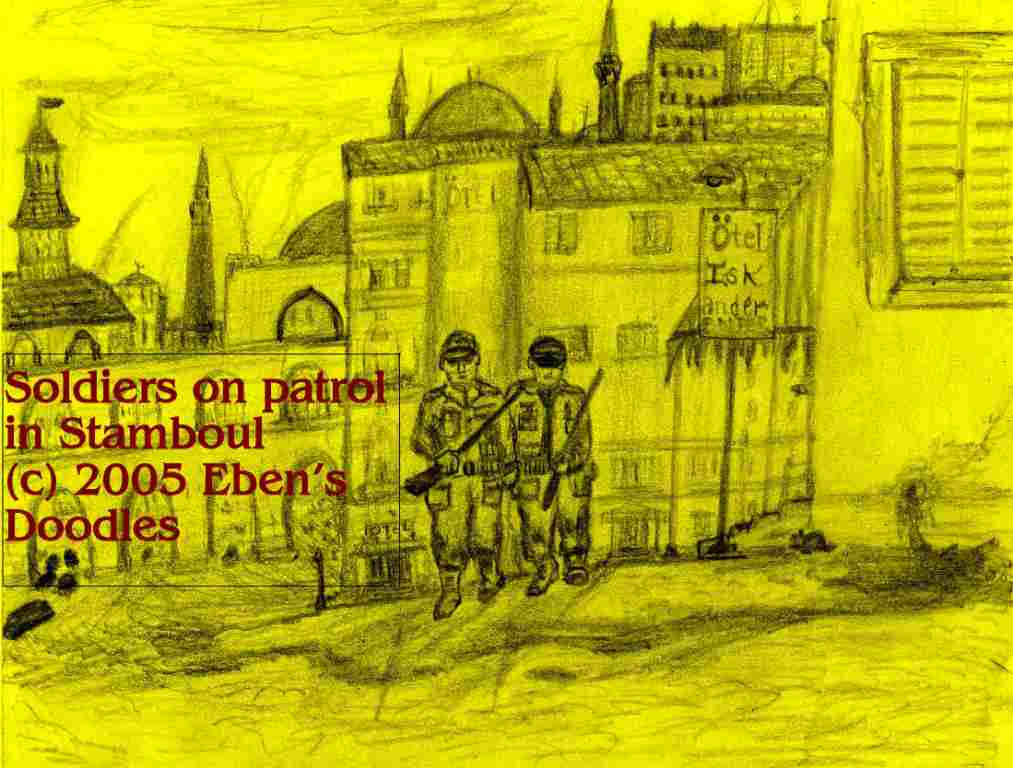
Of course, she ought not to have been garbed in her Greek Orthodox nun’s robe-—for she heard the Turks had outlawed Greek Orthodox clerical garb in public. This was no misfortune for her, she was advised by her religious order. They had given her official permission to go disguised in ordinary clothes then, and not risk having stones thrown her, or, worse, arrest by suspicious police. That would create a lot of difficulty for her order and a calamity for her own virtue!
Such was the convent's procedure, but Lidia let them think what they wanted to think. She wasn't a European Greek--for her heart lay elsewhere than in Athens. No, if she returned to her homeland, she was going back in the clothes she wore for God--not in any shameful disguise!
The decision frightened her, nevertheless. Though the war had been over since the 1920s, the hostilities remained smoldering beneath the surface, she knew. The few Greek who had remained in the city were always fearful of mobs burning down their shops and houses.
How the holy Patriarch of Constantinople and all Orthodox East Rome's churches world-wide could remain in such a place, she could not guess. But he did! What bravery of their leader! It inspired her even now, and she felt boldness she had not guessed she possessed take hold of her legs.
It was good she had come by water, she had been able to land close by the Mother Church, sparing her having to use a lot of Turkish public transportation. After all, she only aimed to see the church, then depart the city as quickly as possible after a day's stay in whatever hotel she could afford. Her boat was due to leave in twenty four hours, so she had no reason to hurry. The walk from the dock at the bridge should only take her twenty minutes, her father had informed her.
How strange she felt, despite her audacious act, wearing her black ankle-length robe and nun's headscarf--which, in a moment of woman's weakness, she almost changed her mind about before the horn blast shook the boat notifying them it was time for the passengers to disembark. It would have been easy for her to pass as an ordinary tourist? Would it matter to God if she came dressed casually as the others into His mighty presence? Absolutely! Even though Turks were savage in their suppression of Greeks--everyone knew that--she revered God more than the Turks. No one, not even the Patriarch, was allowed to dress in his holy garments in public places outside his own church and walled garden compound, yet she wasn't a Turkish citizen. As a free Greek, she was determined to go attired as a nun--and that was that!
She reached the top of the high broad eminence of hilly land on which the Justinian's mighty church stood, commanding the whole area of the city around in which it still stood, despite other huge buildings, all mosques, built many centuries afterwards by the Turks, vast structures that might have overshadowed her but failed to do so, despite great care taken by their architects to surpass the architects of Emperor Justinian.
Crowds were moving toward the entrance to the Church, which was designated a museum and open to tourists. Without much choice in the matter, she let herself be swept along by the pressing crowd. Finally, at the gate, she paid for a ticket with a little Turkish coin called a kurush, and the guard handed her a crude numbered ticket marked “St. Sophia Museum” in English, tearing half of it away for himself.
What was that? She thought she saw, close by the doors, a ghastly half-man, a small, poor creature with only his upper body intact, raising his hands to her and crying out in a bellowing, loud adult's voice full of barbaric words she couldn't bear to hear.
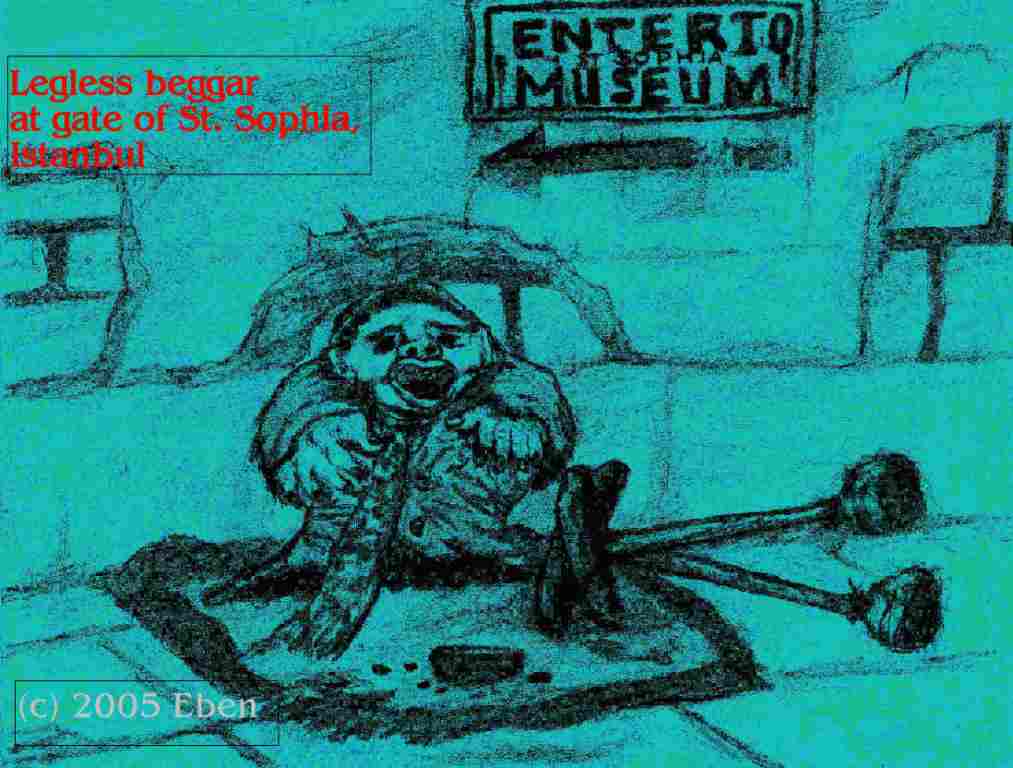
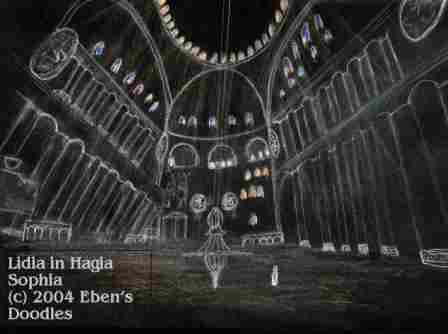
She, Lidia, was in the Mother Church! Could such a miracle be? Thousands of her countrymen had died dreaming of returning to the Holy Church. She herself was the last, perhaps, of her family to achieve such a high privilege. But she felt nothing but a crushing sense of loss. It was unutterable loss! How dingy and dreary the edifice had become at the hands of the Turks! All the light and glory had been stripped away. The Turks had hung huge, shield-like banners in green and gold on the walls of the upper galleries. They were monstrous additions, with no beauty. The holy mosaics had been painted and plastered over, and only a few patches remained in view.
She tried to summon up hope, given by the ancient prophecy that a priest would bear the chalice, the same one who bore it when the last service was interrupted by Sultan Mehmet’s soldiers entering the church. But the cherished dream seemed to be impossible now. Would the Holy Mother Church ever become Christian again?
Lidia, tears in her eyes, looked around in the gloom and infidel strangeness disfiguring the edifice and wanted only to flee back to Greece!
But strength fled instead from her body! Feeling like she could not stand, she clung to a pillar, and felt the coldness of the golden-veined green marble.
After a few moments, she decided she had to go. She had seen all she had come to see—-the Mother Church-—in all its forsaken state.
She did not have to walk far. The streets had hotel signs everywhere she looked. She went in at one--and found they knew Greek and even some English! Amazing! She checked in, and went up to her room, still amazed at the ease of it all, and also how polite the people at the desk were to her. They couldn't be Turks, she decided. Turks weren't that well educated.
In her small, clean room, she freshened up, then sat in the chair by the window, looking out. The street was somehow very fascinating to her--was this really the part that Constantinople had flourished upon for over a thousand years? It must be, she thought. After all, Hagia Sophia was a stone's throw away, so this quarter holding her hotel had to be the heart of the world's greatest and most splendid, holy city of God.
Compared with Holy Orthodox Constantinople before the Turkish conquest, Rome of the rival Papacy and Western Church was nothing but an upstart cow-town!
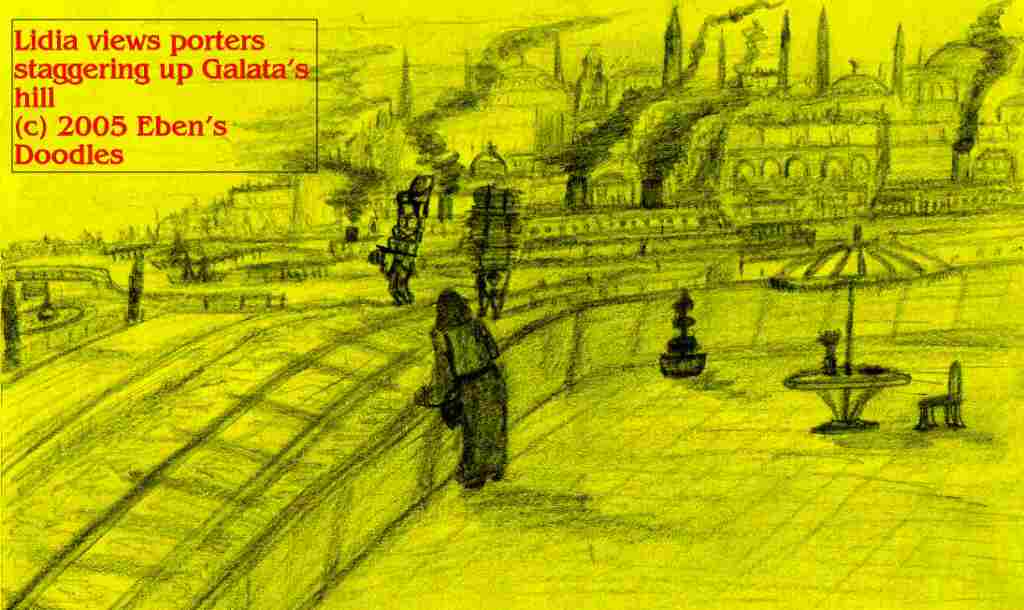
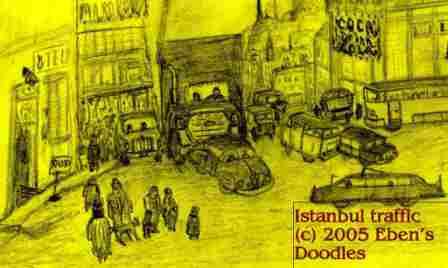
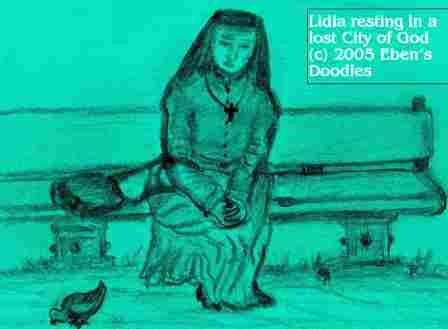
There, preserved as the last surviving remnants of old Greek and Roman glory, she saw an Egyptian obelisk and also the Obelisk of Theodosius, which had once been covered with golden plates. There was even the Serpent Column, which she knew had been forged from the shields of Persians captured in the Battle of Marathon.
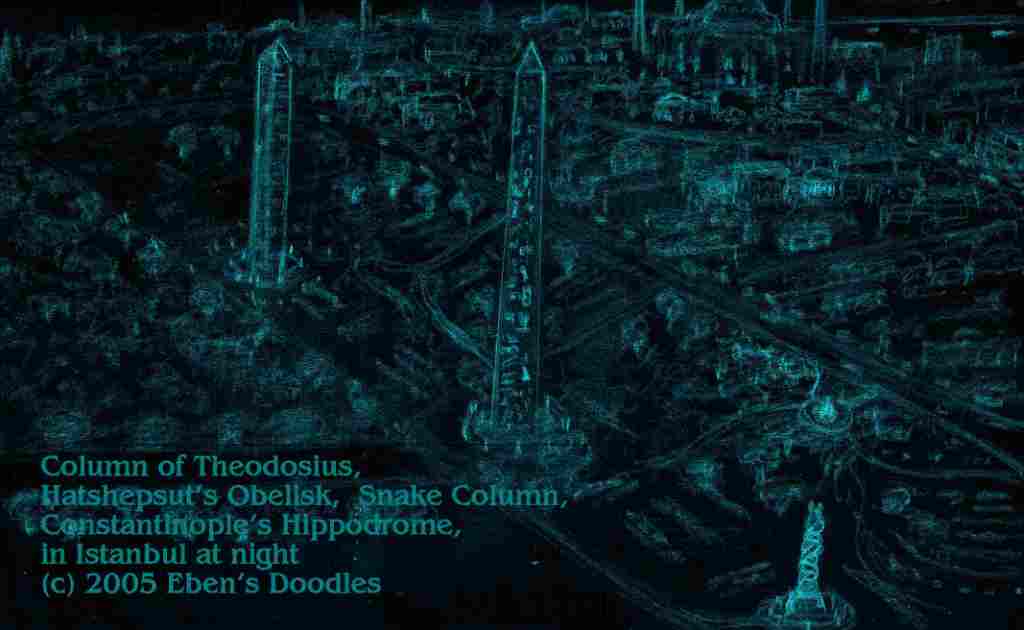
Suddenly, she woke to the fact it was getting quite late for someone like herself to be out in public. But a check of her watch told her that she was all right. She had only used up an hour. She sat down, wondering what to do next. She glanced at the passing people, and as several men began moving her way realized that a lone woman was a target for black marketeers wanting to exchange Turkish currency for her Greek money at an inflated and illegal rate, so she got back to her feet.
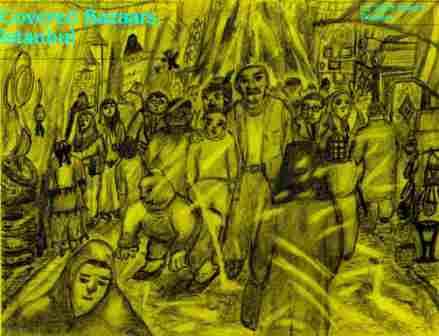
She had no sooner thought that when something happened that startled her so much she dropped her bread.
“I am the Ecnik that comes down from heaven!”
By impulse she moved to snatch up the fallen bread.
“No! leave it there! I came to the earth. Leave me on the earth where I can draw all men unto Me!”
Amazed and confounded that Christ, or whoever the voice was, might call infidel Moslem Turks to his holy courts along with his people, the Greeks, Lidia backed away from the fallen, speaking Ecnik.
Was she going crazy? She wondered. She put her hands to her face, not sure she wasn’t afflicted with a fever that had confused her thoughts. Panic welled up her in her at the thought she was ill in a foreign country, where she knew no one to help her except the Patriarch, and she had no idea where he was living. She couldn’t deal with “talking bread,” so she fled. Walking rapidly, she left the scene as far as she could get away in a few minutes. Soon she had no idea where the Mother Church was located. All around her were strange streets and buildings she was seeing for the first time. Yet she knew she had to walk toward the Galata Bridge, and so that would be located somewhere to the west.
Just as she moved away toward the Galata bridge, hopefully, an unneeded interruption again stopped her. “No, take that bus.”
What? Not again!
But she recognized a mini-bus or van was taking on passengers just then at the edge of the little square. Without any explanation, she went quickly and hopped on. She found herself traveling with decently-dressed, working people. Could these people be Turks? she wondered. They seemed so well-mannered and thoughtful, even to her, an obvious stranger in the city. Since the van was full, it moved quickly without stops and took them eastward. Where would it be taking her? She felt she should cry out and get the van stopped so she could get off. But somehow she had no strength in her, and let the opportunity pass. In a short time she was somewhere on the far eastern side of the city, she guessed vaguely. The driver, having let off the others, swung the van around and opened the door. This was the terminus, evidently. She got off, and the bus darted off without passengers.
She stood looking at it, wondering if she should make herself look a fool and reboard the van, so as to be taken right back to the little square near the Hippodrome Park.
While she was wondering what to do, the bus suddenly sped off, answering her question for her.
There was nothing now to do but find another. But where? It was now late. The commuters were all gone home, enjoying dinner.
She started walking westward and realized then that she had landed beyond the great and famous Walls of Constantinople, which every Greek school girl learned were built by Emperor Theodosius in the 5th century. No other city in the world had been so well protected. Triple-walled and moated, with five hundred defensive towers and fifty gates, the walls had withstood, she knew, every enemy except the Turks, and the Turks had not defeated the walls, they had found entrance through a lightly defended sally port after being held back for seven weeks, though they had 100,000 men and many cannons arrayed against only 8,000 men fighting for the City and East Rome under the Emperor’s banner. She had gone on a previous holiday to a holy place in Romania, where a fresco hundreds of years old, painted on the side of an old convent church, depicted the fall of the City. Standing there, she felt transported back to the very scene, and it was overwhelming, the sadness and tragedy that engulfed her, she could never forget it.
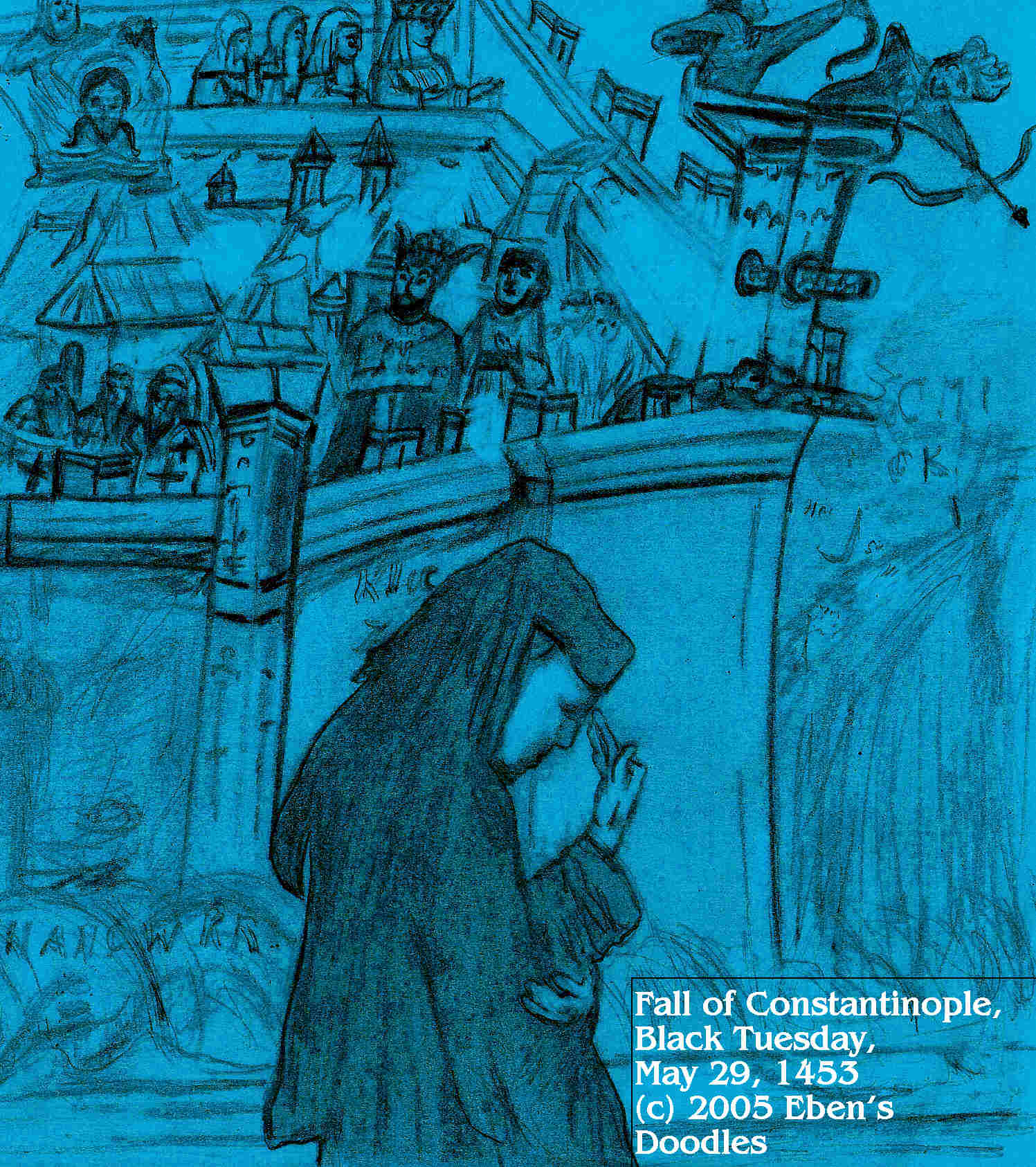
As she gazed at the ring of Titanic walls that once had protected the Holy City from every barbarian horde that ever assailed Christian Civilization, she felt shaken to her core. Suddenly, another voice spoke to her, nearly causing her to cry out with fright.
“This is My city, and I will protect her.”
Hot tears flooded Lidia’s eyes. She cried out without even thinking, as if she had held this thought for a long time. “But you let the City be taken by the infidel Turks! Our Emperor fought and gave his life with his men. But You didn’t defend us!”
She waited, but there was no reply.
Had she imagined the voice? She was going crazy! She thought. She needed to find the ship! Urgency impelled her to quicken her steps. Where was a bus? She needed to get one to stop as soon as she found one! What if she missed her ship? That would be a calamity!
She checked her watch. Two hours remained! To her, however, that seemed little time. She knew she might wander for hours trying to find a way back to the port, Istanbul was that confusing to her.
The rattled, weary nun walked fast, but she knew she had to find transportation, for her legs would give out on the hard pavement. Always employed in infirmary work, and it was a small infirmary without long halls or stairs to climb, he wasn’t used to so much walking. She could not make it to the Galata Bridge in time.
“Lidia!”
She was so startled at hearing her name called in such a place, she nearly lost her footing.
She looked about, but no one in the street was even looking at her.
“Oh no!” she thought, and set her feet back to treading the space between there and the desired port.
As fast as she made herself go, the voice seemed to have no trouble catching up with her. “Lidia!” it called once again.
She slowed down, growing weary all of a sudden. “What?” she finally cried out. “Who is calling me? Am I crazy, hearing voices like this?”
“No, you are not going crazy,” the voice responded. “But you did not wait for My answer. You said I failed to protect this city. It is true, I turned My face away from you for a moment. But I wished to gather in all these others, whom You would not let enter into My holy courts. Yet it is in My plan to restore this City to greatness one day soon. Her Church will rise again in splendor. I will draw all men to Myself in this place, where you once worshipped Me.”
Hearing this, the full meaning seemed to be more than a human soul could bear, and Lidia groaned, drawing notice from passers-by, and she staggered. A woman, carrying groceries while managing a small boy, caught her arm and said something sympathetic. Lidia, bursting into tears at the kindness she saw in the married woman, brushed her away. “Yok,” she said, shaking her head.
“They are Mine too,” the voice continued, dogging her footsteps.
This was too much for Lidia. Anger rose in her. “What, these Turks are Your people too? Who are You, anyway? How could you be God and accept infidels into Your arms, who desecrated Your most holy church and destroyed this city of faith? You cannot be God! I am having a brain fever, that is all!”
She knew she was lost, at that moment, but somehow she didn't care. Carried on the wings of anger, Lidia soon found herself in the environs of the Galata Bridge, for she could hear the ferries hooting and see their smoke plumes. From there she knew how to retrace her steps to her hotel.
In the morning, after a Continental breakfast early in the hotel restaurant, she paid her bill, was given her passport, and left the hotel after thanking the hotel manager and the girls at the counter. She meant it, despite the fact they were Turks.
The streets all sloped down toward the water, with the Golden Horn’s waters feeding into the Bosporus. It was good she could make good time on the downward slope, as she was somewhat close to the sailing time. Within minutes she had the Galata Bridge in sight.
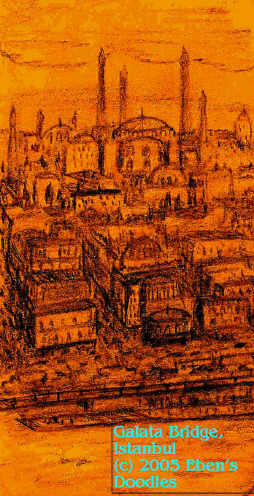
With even greater relief she ran up the gangplank and when she was safely onboard she stopped, gasping for breath.
She checked the time, and she had a half hour to spare! Had she covered so much ground by herself on foot? It didn’t seem possible, but her presence on the ship was proof! From the hotel on the top of Stamboul where Hagia Sophia reposed in all her forlorn splendor she had evidently flown like a bird!
She found a chair at a table and sat down, relieved that her handbag was still in her possession, not stolen by someone in the crowds of Turks she had passed through. Now she could relax and even take out her camera and take a few pictures of the city from the upper deck.
Ordering tea, she took the tea and felt her old self revive enough so she wanted the pictures. Climbing up, she found the height was sufficient to gain a panoramic view of the city ringing the shores on both sides of the Bosporus. Though the immediate vicinity of the bridge was grime-covered, the sun sparkled on the white villas and palaces clustered along the beaches and right to the shoreline.
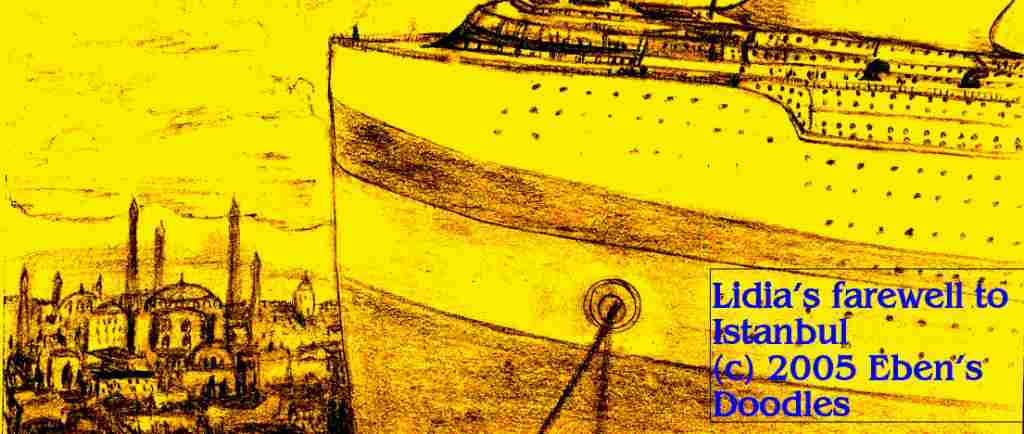
Twenty minutes later the EMPIRE OF TREBIZOND had made its last call and the gangplank was retrieved. The ship began moving away, nudged by tugboats. Finally, the ship’s engines took over and the vessel moved toward the Sea of Marmara for the return voyage.
The fellow Greek being spoken around her restored her spirits. She felt glad she was leaving, yet tears rose in her eyes as the City receded from view. The domes and minarets, she could not help acknowledging, were most beautiful and impressive. What city looked so grand from the water? Athens had a port, Piraeus, and lay inland without the beauty of the sea or a large lake. No wonder her parents had wept at the last sight of her from their ship when they fled to Athens to get away from Ataturk’s forces! They were weeping still for lost Constantinople, just as she was now weeping.
Then it happened. The voice let her have a parting shot.
“I am returning here,” it said quietly. “I have put your tears in My bottle with all the other tears shed for My holy church. When I raise up My holy church, I will draw all men to Me on this hill of the great city that commands the gate of the waters to the north and south. There all men will glorify Me.”
Lidia shuddered. She could not fight anymore if He chose to adopt Turkish barbarians as heirs along with His Greek children. What if she were fighing the will of the Almighty God? She thought. After all, she recalled that her own Greeks were nothing but lost pagan Gentiles until St. Paul brought the Gospel from Antioch in Syria.
She put her hands over her face. “Yes, forgive me, O Lord,” she said. “Thy Will be done!”
Sitting down in a deck chair, the wind swept her whole body. It was a mighty wind. She felt as if it were a wind from heaven itself. She wondered, clinging to her chair, whether the wind might carry her off the deck and drown her in the sea.
Struggling out of the chair, she caught herself on the railing, and the wind pinned her there for some moments, helpless against its mighty strength.
“The Will of God is like this great wind,” she thought. “How can man stop such great power? It would be useless to try.”
The wind slackened, and freed from it she gazed back into the wind toward the receding City of Constantine and, later, Mehmet the Conqueror. But the clouds covered the domes and minarets, and she couldn’t see any sign of it. All around her and the ship a school of tuna were shooting through the waves. It was suddenly as if a new day had dawned, so vital and full of hope that all things were become new.
Lidia wiped her eyes and fixed removed her scarf, letting her hair fly free in the breeze. She looked over the railing, admiring the leaping fish that raced alongside the ship. Ahead she saw the Princes Islands and their waterside villages and villas. Beyond them lay the open stretches of the Sea of Marmara, a crystal sea into which you could see to a great depth.
“How beautiful, how strong and vast, is my native land in Asia!” she thought with a wrenching sensation deep in her heart, forgetting European Greece. She fell into sadness at that moment, realizing what she had thought.
Later, disembarking at Athens, she felt as if she were not returning home but touring in a strange country. Greece was not her home and would never be her home, she felt. Her family wondered at the change in her and didn’t know what to make of the few remarks she made concerning her trip. Wasn’t she angry how the Turks had desecrated Hagia Sophia? Wasn’t she enraged that they had stolen the gold of the church and used it to build heathen mosques? No, she was not angry. She wasn’t enraged. Like the Patriarch, she was committed to a place where the Lord himself had just promised her He would return. But she couldn’t be angry and vengeful anymore. She and the unknown mother in the streets who had reached out to her to help her were one in heart and spiritual destiny. That was what she knew for certain. God had chosen them to be one people-—however impossible, politically, that was in the present divided world.
Love flooded into her heart for the Turkish people for the first time. No longer, hearing the Turks castigated as barbarians and robbers, could she agree and join in, denouncing the Turkish people as the enemies of the Greeks and the enemies of the Holy Church of the Apostles. No, if the Lord God had chosen them, then they were His children too! For Lidia, the realization set her apart all the rest of her days. She could no longer pray against the Turks as the other sisters commonly prayed in the chapel. Yes, the Lord would restore the Mother Church to Christian hands, but the hands would be both Greek and Turkish! Imagine that! Yet, the Lord had told her it was to be so! She knew it would be so, though at the time she had fought all she could against it.
Indeed, that was the splendor and beauty she had carried away from Istanbul (she checked herself before she saying "Constantinople"). No, not the beauty of its seaside setting or grand imperial monuments--which Instanbul, for all its workaday grit and turmoil was full of--rather, she would always keep, as a going-away gift she had never expected, the sheer beauty of knowing God was One Father to all peoples that the years and no amount of human anger and unforgiveness could ever take away. Hard-won as it was through the suffering and losses of her people through the centuries, it was all the more precious for being a gift to her and her people--and she knew she would never, never give it up.



